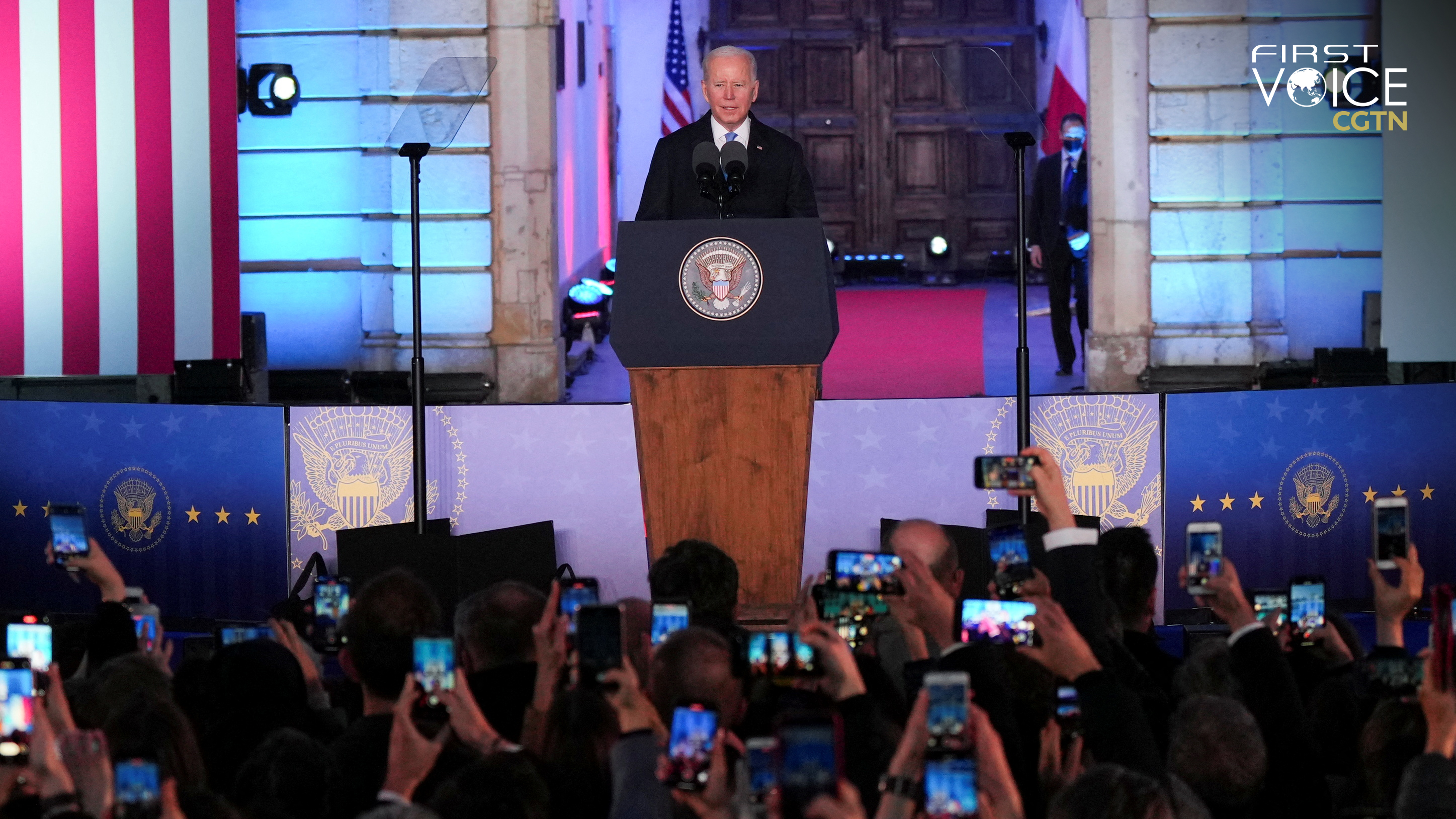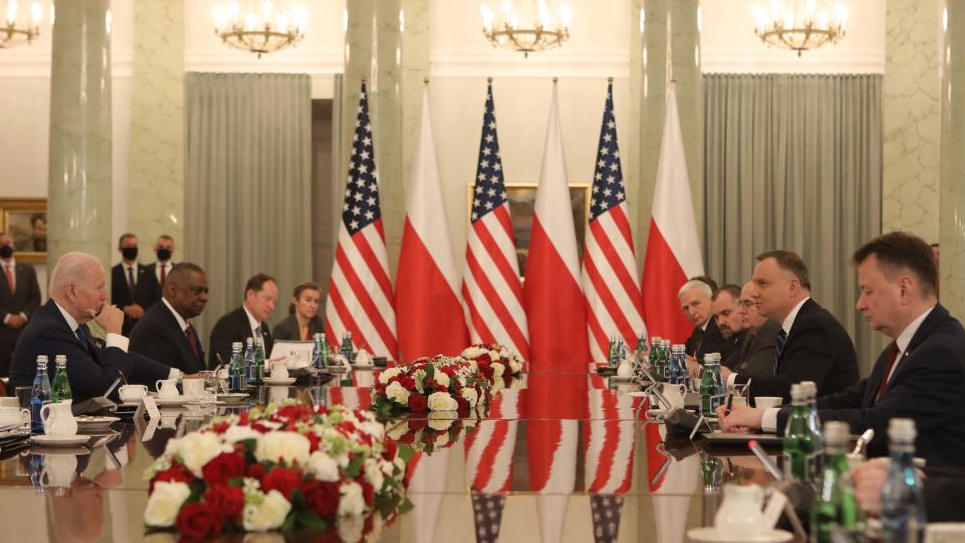
Editor's note: CGTN's First Voice provides instant commentary on breaking stories. The column clarifies emerging issues and better defines the news agenda, offering a Chinese perspective on the latest global events.
U.S. President Joe Biden pledged to continue "supporting" Ukraine in his address in Poland on Tuesday. A day earlier, Biden made a "secret" visit to the Ukrainian capital Kyiv and promised a fresh tranche of weaponry worth $500 million.
"I can proudly say that our support for Ukraine remains unwavering," Biden vowed ahead of the first anniversary of the Russia-Ukraine conflicts.
But does Ukraine need such "support?"
Washington's intervention will only prolong and exacerbate the crisis and make a peaceful resolution much more difficult.
Hidden agenda: Profiteering from conflicts
While Biden is trying to bolster NATO's defense and demonstrating Washington's support for Ukraine and Eastern Europe, his actions have raised severe concerns over the underlying hegemonic agenda. One must be mindful that the U.S. has a long history of profiting from conflicts and arms sales, and its actions in the region have often been more about expanding its clout and strengthening NATO than about promoting peace.
Since becoming the world's most powerful country after the two world wars and Cold War, the U.S. has acted impudently to interfere in the internal affairs of other countries, pursue, maintain and abuse hegemony, advance subversion and infiltration, and willfully wage wars, bringing harm to the international community.
It's well-documented how the U.S. has long exploited conflicts to expand its influence and control over other countries. The wars in Vietnam and Iraq are just two examples of how the U.S. has used military force to assert its power over other nations. In both cases, the U.S. claimed to be acting in the interests of freedom and democracy, but the real motive was to gain control over these countries and their resources.
Arms sales have also been a major source of profit for the U.S. military-industrial complex. The U.S. is the world's largest arms exporter, and it has supplied weapons to numerous countries involved in conflicts around the world. The U.S. government often justifies these sales by claiming that they are necessary to support U.S. allies and promote stability in the region. However, in many cases, the weapons end up being used to perpetuate violence and oppression.

U.S. President Joe Biden (1st L) holds talks with Polish President Andrzej Duda (2nd R) in Warsaw, Poland, March 26, 2022. /Xinhua
U.S. President Joe Biden (1st L) holds talks with Polish President Andrzej Duda (2nd R) in Warsaw, Poland, March 26, 2022. /Xinhua
Eastward NATO: A bone of contention
The U.S. has also used conflicts to strengthen control over its European allies and expand NATO's eastward expansion to encircle Russia. The U.S. has been accused of using NATO to promote its own economic interests, by pushing for the privatization of state-owned industries and the adoption of neoliberal economic policies.
Washington played a pivotal role in the breakup of Yugoslavia in the 1990s, and it has endorsed the NATO's eastward expansion ever since. This has been a major point of contention between the U.S. and Russia, which sees the expansion of NATO as a threat to its security. This is also one of the primary reasons responsible for ongoing Russia-Ukraine conflicts.
Given this history, it's not surprising that many are skeptical of Biden's surprise visit to Ukraine and his Poland trip. While the U.S. claims to support Ukraine in its struggle against Russia, it's worth remembering that the U.S. played a crucial role in the 2014 coup that overthrew the country's elected government. The U.S. has also provided military aid to Ukraine, which has only escalated the conflict and contributed to thousands of people's deaths.
Likewise, the U.S. has a long history of meddling in Poland's internal affairs. During the Cold War, the U.S. supported the anti-Communist Solidarity movement, which played a role in the fall of the Soviet bloc. Since then, Washington has exerted influence in Poland, using the country as a base for its military operations in Europe. This has only heightened tensions between the U.S. and Russia.
Reduce tensions, stop provoking
Instead of exerting more control over Ukraine and Poland, the U.S. should focus on promoting peace and stability in the region. This means ending its support for the ongoing conflict in Ukraine and instead supporting diplomatic efforts to resolve the conflict. It also means working to reduce tensions with Russia, rather than taking actions that would provoke a response.
Moreover, the U.S. should focus on addressing the root causes of conflict and instability in Eastern Europe, rather than perpetuating the problem through its actions. The U.S. should work to promote economic development and to address issues such as corruption, which contribute to instability and conflict in the region. Furthermore, the U.S. should stop using human rights and democracy as a pretext for military intervention.
President Biden's surprise visit to Ukraine and his Poland trip are not in the best interests of the people in these countries. Washington's "support" has only contributed to conflict and instability in the region, and this is not what the region wants.
(If you want to contribute and have specific expertise, please contact us at opinions@cgtn.com. Follow @thouse_opinions on Twitter to discover the latest commentaries in the CGTN Opinion Section.)